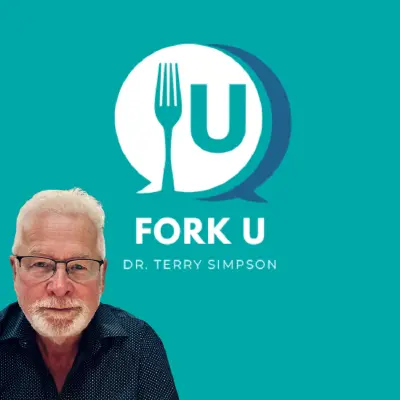Podcasts about Nutrition
Episodes about Nutrition

Jul 14, 2025
#203 The Gym Owner’s Guide to Running a Fall Nutrition Challenge
Grow Your Nutrition Business ❭
A must-listen for gym owners planning a fall nutrition challenge. Inside this episode, we walk through the proven Healthy Steps Nutrition framework that’s helped over 5,000 coaches launch successful challenges that boost engagement, drive results, and convert participants into long-term clients. You’ll learn: ✅ The overall fall nutrition strategy for maximum impact ✅ The best time to launch your challenge to increase engagement and conversion ✅ How long your challenge should be (and why it matters) ✅ Answers to the most common questions gym owners ask when planning a challenge 💡 Want to save time and avoid reinventing the wheel? The Healthy Steps Nutrition Challenge Intensive is a plug-and-play system to plan, launch, and execute a professional nutrition challenge inside your gym. Exclusively delivered through the Healthy Steps Nutrition App. Enroll here: https://growyournutritionbusiness.com/turn-key-nutrition-challenge-for-gym-owners/
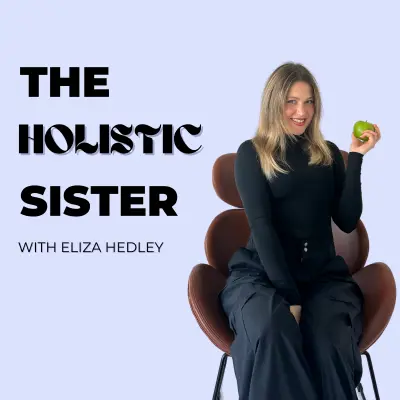
This weeks episode I wanted to get into why an IBS diagnosis is bullshirt - and what actually drives IBS, symptoms of, how to manage and support from a nutritional standpoint. Use "HOLISTIC" at check out for MyBrainCo Gut Repair -

Jul 11, 2025
231.The Hidden Truth About Kidney Health, Detox, and Emotional Healing
The Whole Body Detox Show ❭
In this powerful episode of The Whole Body Detox Show (Episode #231), David DeHaas, founder of Living Waters Wellness Center, takes a deep dive into the alarming rise in kidney disease—and what you can do to prevent it naturally.Learn how common toxins, glyphosate-laden foods, emotional trauma, and everyday habits like using a microwave or drinking from aluminum cans could be damaging your kidneys. David shares eye-opening personal stories, natural remedies, and holistic protocols that have helped hundreds of clients regain kidney function and overall health through detoxification and emotional release.This episode also unpacks:The link between arthritis, blood pressure, and kidney healthWhy dehydration and sugar are silent kidney killersHow colon hydrotherapy and lymphatic cleansing can heal the bodyHerbs like Chanca Piedra, Astragalus, and Stone Breaker for natural kidney supportThe emotional root of kidney issues: criticism, fear, and shameHow juicing, castor oil packs, and apple cider vinegar can assist kidney detoxWhat 10-day healing retreats can do for reversing early-stage kidney failure“Most diseases begin emotionally. You can’t wait to get sick before you act.” —David DeHaas🌐 More Info:🎙 Hosted by: David DeHaas🏢 Living Waters Wellness Center🌐 Website: https://livingwaterscleanse.com📞 Call: 208-378-9911🎧 Podcast: The Whole Body Detox Show📍 Location: Boise, Idaho 🙌 Ready to heal your body from within?Schedule your 10-day healing retreat with Living Waters Wellness Center and start your journey to restored kidney function, improved energy, and vibrant health.Support the show Ready for your healing journey?Visit our website: www.LivingWatersCleanse.com Or give us a call at: (208) 378-9911Stem Cell Activation Patches:www.StemCellPatch.netGet your Supplements and Natural Body Products Here:www.livingwaterscleanse.com/supplementsQI-Shield EMF Devices:Protect your whole home or office with a touric shield from EMF's. 1. QI Shield Covers 16'x16' 2. QI Home Covers 50' x 50' 3. QI Max Covers 250'x250'Click on link and enter Livingwaters in discount code section during checkout Magnesium Soaks:Follow us on our socials: Living Waters Wellness CenterBitChute: www.bitchute.com/livingwaterswellnessRumble: www.rumble.com/l...
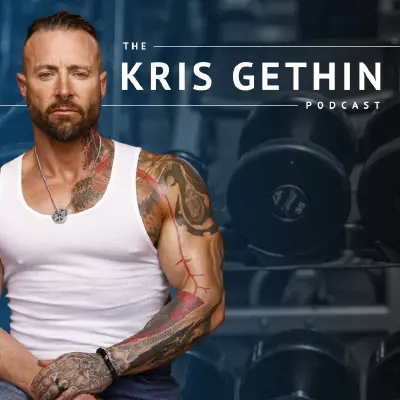
Are you stuck at a fat loss plateau despite perfect diet and training? In this episode of the Kris Gethin Podcast, I break down the peptide protocols that changed everything - no fluff, just the compounds that actually work for stubborn fat, metabolic plateaus, and body recomposition. I've been using peptides since 2017, starting with the Wolverine stack for injury recovery. Now I'm getting flooded with questions about fat-burning peptides, and rightfully so - these compounds are showing serious promise when used correctly. You'll learn the mechanisms behind AOD9604, 5-amino-1-MQ, SLUPP332, tesamorelin, ipamorelin, tesofensine, and CJC-1295. I explain how these peptides increase lipolysis, prevent fat storage, suppress appetite, and enhance insulin sensitivity. Listen in for the clinical evidence, safety protocols, blood work requirements, and why these aren't magic bullets. Let’s get into it. I Also Discuss: (00:41) My First Peptide Stack and Why I Started Using Them (02:58) What Peptides Are and Why They're So Powerful for Fat Loss (05:24) AOD9604: The Pure Fat Loss Agent That Targets Only Adipose Tissue (07:19) 5-Amino-1-MQ: The Game Changer for Metabolic Plateaus (09:42) SLUPP332: The Exercise Mimetic That Browns Your Fat (11:42) Tesamorelin: The Visceral Fat Assassin for Dangerous Belly Fat (13:06) Ipamorelin: Precision GH Catalyst for Muscle Preservation (14:36) Tesofensin: The Appetite Annihilator for Cravings and Binge Eating (15:44) CJC-1295: Enhanced Lipolysis and Metabolic Rate Boost (18:18) Critical Safety Protocols and Blood Work Requirements Thank you to our sponsors: NAD + Cell Shield from Biostack Labs https://biostacklabs.com/kris BiOptimizers - code KRIS10 for 10% off https://bioptimizers.com/ Find more from Kris: Website: https://www.krisgethin.com/ Instagram: https://www.instagram.com/krisgethin/ Youtube: https://www.youtube.com/krisgethin
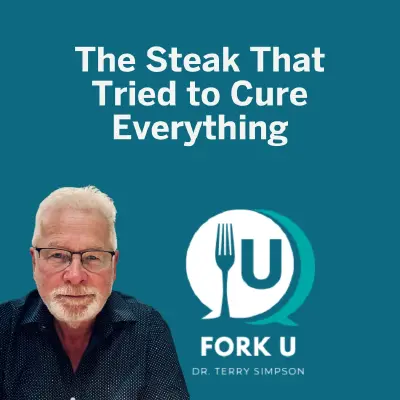
Who Was Dr. Salisbury?First, let’s meet the man behind the meat.Dr. James Henry Salisbury was a doctor during the American Civil War. He worked hard to understand why so many soldiers got sick. He noticed that stomach problems like diarrhea and dysentery were everywhere in the army camps.Because of this, he believed the problem came from food. But instead of looking at germs, he blamed vegetables.That’s right—he thought vegetables caused disease. To children everywhere, he became a hero. To science? Not so much.What Did He Believe?Dr. Salisbury believed that vegetables and starchy foods rotted in the gut. He said they caused inflammation and sickness. He thought the best way to stop disease was to eat meat—and only meat.So, he created a special food: the Salisbury steak.This steak wasn’t fancy. He ground up lean beef, shaped it into a patty, and told people to eat it three times a day. With it, they could drink only hot water or black coffee.No fruit.Absolutely no sugar.No grains.And definitely no vegetables.Why Did It Seem to Work?At first, some people felt better on the Salisbury diet. But why?Here’s the real reason: it wasn’t the meat. It was the boiling.Back then, most water carried bacteria. That bacteria caused all kinds of sickness. When soldiers boiled coffee, they accidentally killed the germs in the water. When they ate fully cooked meat, they avoided raw, dirty food.So yes, people improved. But not because vegetables were bad.They got better because boiled water and cooked meat killed bacteria.What Did He Get Wrong?Now, let’s talk about what he missed.❌ He didn’t understand germs or bacteria❌ He thought fiber was dangerous❌ He blamed plants, even though they weren’t the problem❌ He didn’t test his ideas—he just believed themHe meant well, but he built a health plan on the wrong cause.Instead of fixing the real issue, he created a food myth that lasted for years.Why Does This Still Matter?Even though Dr. Salisbury lived over 150 years ago, his ideas are back—on TikTok.Some people today say meat is the only healthy food. They avoid fruits, grains, and vegetables. They blame plants for everything from bloating to brain fog.Sound familiar?They’re repeating Salisbury’s mistake. They’re trusting old beliefs instead of new science.What Science Says NowLet’s be clear. Science today tells a different story.✅ Vegetables help your gut, heart, and brain✅ Fiber feeds healthy gut bacteria✅ A variety of foods lowers your risk of disease❌ Eating only meat can cause nutrient problems and long-term risksInstead of eating like it’s 1863, you can follow a plan that supports your body and your taste buds.The best example? The Mediterranean diet—with healthy fats, lean protein, vegetables, fruits, and yes… even a little red wine.In SummaryDr. Salisbury had a strong idea—but he missed the mark.He didn’t know about bacteria. He thought vegetables were the enemy. He gave us Salisbury steak, but also gave us a lasting food myth.So next time someone says vegetables cause disease, just smile and say: “We’ve been down that road. It was dusty, undercooked, and came
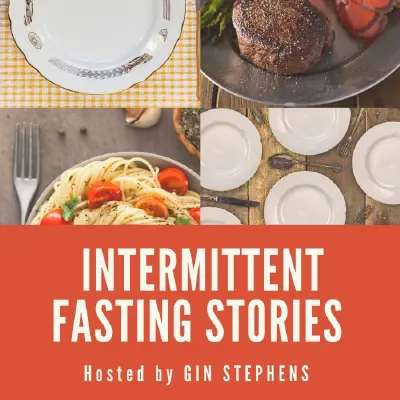
In this episode of Intermittent Fasting Stories, Gin talks to Andrea Moon from Bloomfield Township, MI.Gin has a new YouTube Channel! Visit https://www.youtube.com/channel/UC_frGNiTEoJ88rZOwvuG2CA and subscribe today so you never miss an intermittent fasting tip, a support session, or an interview with a past IF Stories guest or expert.Are you ready to take your intermittent fasting lifestyle to the next level? There’s nothing better than community to help with that. In the Delay, Don’t Deny community we all embrace the clean fast, and there’s just the right support for you as you live your intermittent fasting lifestyle. You can connect directly with Gin in the Ask Gin group, and she will answer all of your questions personally. If you’re new to intermittent fasting or recommitting to the IF lifestyle, join the 28-Day FAST Start group. After your fast start, join us for support in The 1st Year group. Need tips for long term maintenance? We have a place for that! There are many more useful spaces beyond these, and you can interact in as many as you like. Visit ginstephens.com/community to join us. An annual membership costs just over a dollar a week when you do the math. If you aren’t ready to fully commit for a year, join for a month and you can cancel at any time. If you know you’ll want to stay forever, we also have a lifetime membership option available. IF is free. You don’t need to join our community to fast. But if you’re looking for support from a community of like-minded IFers, we are here for you at ginstephens.com/community. Andrea is not only a retired elementary music teacher but also a piano composer, karate instructor, and women’s self-defense teacher. They dive right into how Andrea discovered intermittent fasting in 2023 after hearing about it from a friend, initially reacting with skepticism before getting curious and quickly diving into podcasts and resources. A structured person by nature, Andrea took to tracking her fasting hours with an app, finding the visual goal-tracking motivating, and soon made fasting a daily habit, even amidst travel and a busy, active lifestyle.Andrea shares several anecdotes highlighting how intermittent fasting has become more mainstream, citing moments in pop culture and interactions with global karate colleagues who also fast. She describes her initial fasting experience, gradually finding what worked best for her, including experimenting with alternate day fasting (ADF) and 500-calorie down days. Andrea found joy in making down days a fun challenge by cooking satisfying meals within calorie limits, and she emphasizes the flexibility and long-term sustainability she now feels with intermittent fasting.A significant part of the conversation centers on mindful eating, overcoming toxic diet culture, and the freedom that comes from ditching rigid calorie restriction. Andrea candidly recounts her own weight plateaus and how shifting away from eating while distracted—especially stopping the habit of eating in front of the TV—made a real difference in her progress. She encourages listeners to track their weight over weeks, not days, and to adjust their process (including mindful, plated meals) rather than simply trusting the process when stuck. Both Gin and Andrea also reflect on the pitfalls of diet brain, the importance of eating real foods over ultra-processed choices, and the culture of comparing oneself to unrealistic standards.Andrea finishes the episode by sharing her advice for anyone starting out: celebrate finding intermittent fasting, consistently plate your meals, avoid distracted eating, and prioritize some form of exercise or stretching routine. She advocates for patience, embracing the journey, and seeking out community to find inspiration and support along the way. Andrea’s story is a testament to adapting intermittent fasting to fit your life, making mindful choices, and prioritizing long-term health and enjoyment over short-term restriction.Get Gin’s books at: https://www.ginstephens.com/get-the-books.html. Good news! The second edition of Delay, Don’t Deny is now available in ebook, paperback, hardback, and audiobook. This is the book that you’ll want to start with or share with others, as it is a simple introduction to IF. It’s been updated to include the clean fast, an easier to understand and more thorough description of ADF and all of your ADF options, and an all new success stories section. When shopping, make sure to get the second edition, which has a 2024 publication date. The audiobook for the second edition is available now! Join Gin’s community! Go to: ginstephens.com/communityDo you enjoy Intermittent Fasting Stories? You’ll probably also like Gin’s other podcast with cohost Sheri Bullock: Fast. Feast. Repeat. Intermittent Fasting for Life. Find it wherever you listen to podcasts. Share your intermittent fasting stories with Gin: gin@intermittentfastingstories.comVisit Gin’s website at: ginstephens.com Check out Gin’s Favorite Things at http://www.ginstephens.com/gins-favorite-things.htmlSubscribe to Gin’s YouTube Channel! https://www.youtube.com/channel/UC_frGNiTEoJ88rZOwvuG2CASee Privacy Policy at https://art19.com/privacy and California Privacy Notice at https://art19.com/privacy#do-not-sell-my-info.
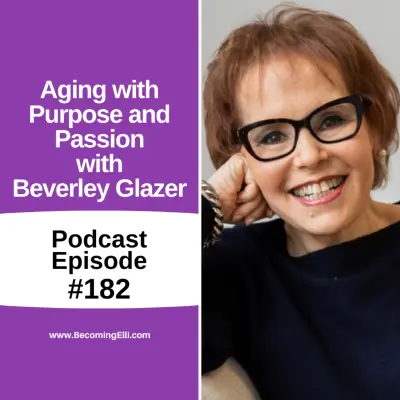
In this inspiring episode of the Fit Strong Women Over 50 podcast, hosts Chris and Jill sit down with Beverley Glazer, seasoned psychotherapist, empowerment coach, and host of the Aging with Purpose and Passion podcast. With over 30 years of experience helping women overcome adversity and step confidently into new life chapters, Beverley brings a wealth of wisdom and practical strategies for navigating midlife with resilience and authenticity. Beverley shares why she’s passionate about working with women over 50, what it really means to “redefine midlife,” and how we can all reclaim our purpose—even after life’s biggest transitions. From managing the emotional challenges of the empty nest or the end of a career, to battling ageism and discovering meaningful goals, Beverley offers compassionate advice and powerful encouragement. For more information and links, visit our website at BecomingElli.com

Jul 08, 2025
Less Filler, More Function: Lasers, Regenerative Aesthetics, & Minimally Invasive Procedures with Dr. Cameron Chesnut
Well-Fed Women ❭
We’ve all seen it. Botox, filler, and quick fixes are everywhere, but are they the best solution? Today, facial plastic surgeon Dr. Cameron Chesnut unpacks taking a holistic approach to aesthetics. We talk the truth about Botox and filler, and discuss lasers, regenerative treatments, and minimally invasive surgical options.Timestamps:[1:45] Intro[4:05] Interview with Dr. Chesnut[11:04] What do you think most people are getting wrong in the aesthetic industry? [18:18] Can you define the term "minimally invasive" and how do you determine what’s enough for somebody?[27:22] What does regenerative really mean within the context of aesthetics? [30:38] What is your take on microneedling? [33:51] If someone has "good skin", does it make sense for them to do microneedling?[36:28] Can you explain the difference between PRP and PRF? [39:17] Can you break down the different types of lasers, how they work, and if we should avoid specific ones?[49:35] What is the insignia lift rejuvenation and why is it different from a traditional lift? [51:26] Can you give your thoughts on Sculptra, the pros and cons and then BBL, broad band light? and is it what are its long -term effects?[56:09] What’s the most effective way to get the lines around your mouth away or the deep set wrinkles in the forehead?[1:00:46] Are there treatments aside from laser that treat acne scaring? [1:03:16] Can we talk about jowls - I see my family jowls Curse starting to appear. Once they appear what’s the best treatment?[1:06:32] What’s the best procedure to help with droopy eyelids?Episode Links:Follow Dr. Cameron on InstagramJoin the Clinic 5C CommunitySponsors:Go to drinklmnt.com/wellfed and use code WELLFED to get a free 8-pack with any drink mix purchase!Go to boncharge.com/WELLFED and use coupon code WELLFED to save 15% off any order.Go to mdlogichealth.com/defend and use coupon code WELLFED for 10% off.Go to wellminerals.us/creatine and use code WELLFED to get 10% off your order.

Struggling to stick to your diet? In this week's episode of the Outsmart Overeating Podcast, Coach Steph and I reveal the sneaky little lies you tell yourself that sabotage your weight loss goals. We dive into the top five most common lies you tell yourself—like “I’ll start tomorrow” or “I deserve it”—that keep you trapped in a cycle of overeating. With actionable strategies and our proven Mindshift Method, you’ll learn how to reframe these thoughts, take control of your mind, and finally break free from the excuses holding you back. Tune in to discover how different thoughts lead to different outcomes and how developing this valuable skillset can transform your relationship with food and propel you towards permanent weight loss. Connect with Leslie: • Website • Instagram • Facebook If you’re struggling with emotional, binge, or compulsive eating and want to master self-control at every bite while turning the volume down on food noise, watch the FREE "Curb the Urge" mini-training and download the accompanying workbook. Or, if you want to be the first to know when we're opening the doors to our signature psychology-based weight loss program, Outsmart Overeating (and get access to early bird discounts and fast action bonuses), join the Interest List.
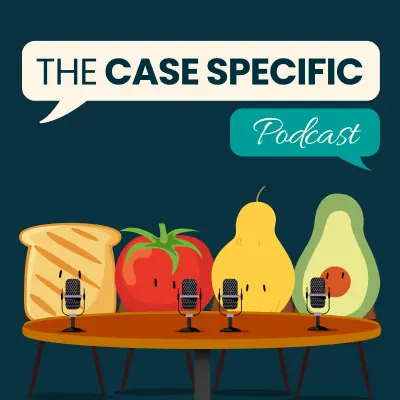
In this episode, registered dietitians Andrew and Devon dive headfirst into the world of carbohydrates and how they affect our hormones. From the confusion around allergies, sensitivities, and intolerances, to the science behind sugar fearmongering, to why organizing your fridge actually matters — this episode has it all. Whether you’re a long-time listener or new to the pod, this is the perfect place to jump in. You’ll get a taste of the no-nonsense, evidence-based, and always entertaining nutrition conversations Andrew and Devon are known for. Follow us on Social Media: https://www.instagram.com/casespecificnutrition/?hl=en Get Matched with a Dietitian: https://casespecificnutrition.com/match
